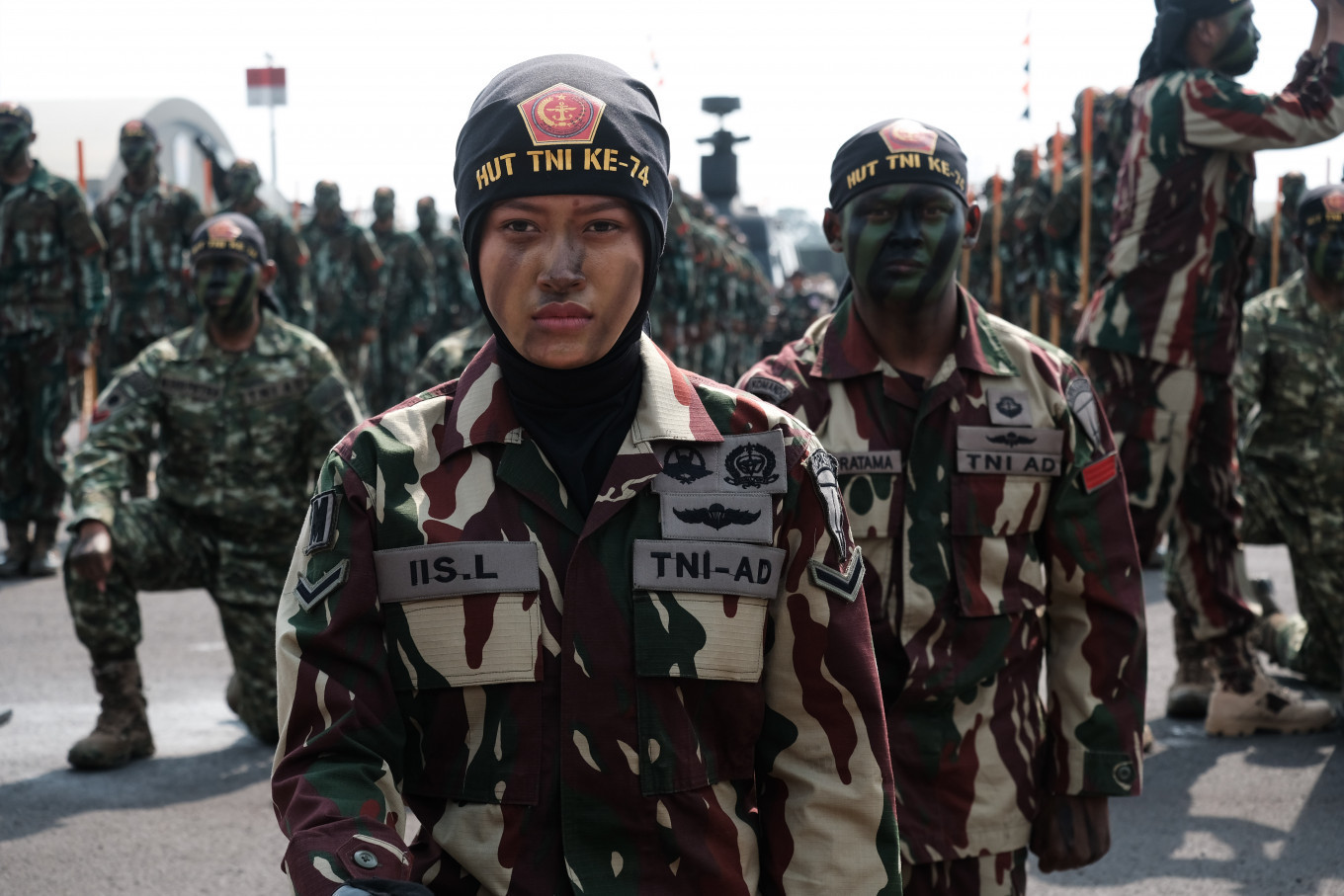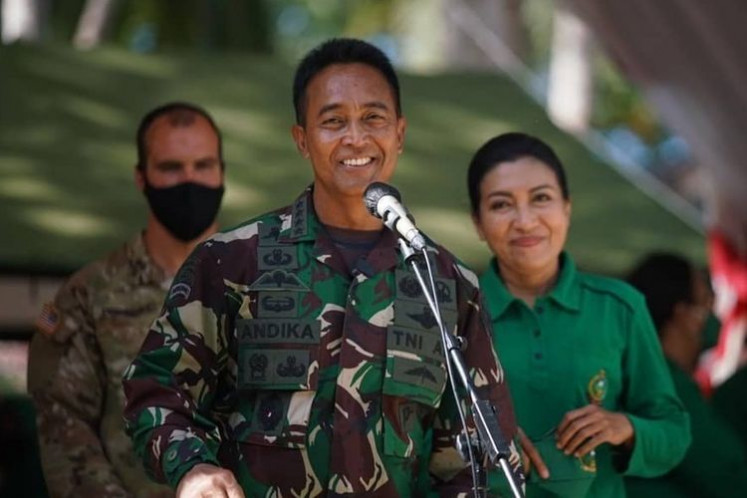Popular Reads
Top Results
Can't find what you're looking for?
View all search resultsPopular Reads
Top Results
Can't find what you're looking for?
View all search results‘Really painful to walk’: Women speak up about state ‘virginity testing’
Following the abolishment of ‘virginity testing’ on female applicants to the Indonesian Military (TNI), The Jakarta Post spoke with women who had gone through the invasive procedure.
Change text size
Gift Premium Articles
to Anyone
"When I signed up for the police academy in 2015, I thought going through a 'virginity test' was par for the course," said Lintang, who chose to use a pseudonym for this article. She was 18 when she enrolled in the Madiun police academy in East Java.
Invasive state 'virginity testing' was long defended as a health assessment, and female applicants to the Indonesian Military (TNI) and National Police were subject to it for decades, starting in 1965, despite global criticism from organizations including Human Rights Watch and the World Health Organization. It was, until recently, a prerequisite for entering the Army.
Uci, a 27-year-old, expected this 'virginity test' when she signed up to join the National Police in 2014, after hearing that a male relative who had joined the force was made to undergo a similar test.
Both men and women had their genitals checked as part of the application process, but while male candidates were tested for reproductive health reasons, women were subject to judgement based on notions of sexual purity.
"If 'virginity' was the criterion that the state was searching for, it was unfair given what male applicants went through. There is no biological sign that verifies a man’s virginity," Uci said. While she believed pregnancy would make it hard for a woman to serve in the armed forces, Uci questioned why one’s virginity was relevant for national service at all.
Read also: ‘Don’t Touch Me!’: Danilla, Marion Jola, Ramengvrl roar against misogyny, sexism
National Police medical and health center head Brig. Gen. Arthur Tampi said in 2014 that failing the 'virginity test' did not disqualify an applicant. But such applicants were awarded fewer points toward the score that determined whether they could join the force. The scoring system remains opaque.
Not allies
Lintang and other applicants were assembled in rows for the health assessment, bare-chested, with only their pants covering their bodies. Lintang recalled a perplexing remark made by a female doctor who was conducting the test.
The applicants’ discomfort was palpable, and one candidate covered her chest with her hands. In response, one of the female doctors said, "You guys are lucky. Back then, we were examined by male doctors when we applied to the institution. Now stand up straight."
"It was as if being examined by a doctor of the same sex was supposed to invalidate the uneasiness," Lintang said. She was saddened by the lack of solidarity between the women of differing positions. Both Lintang and Uci’s groups had their ‘virginity tests’ performed by female doctors and nurses, but they said it didn't alleviate the pain or shame.
In the name of love
A similar test was also imposed on the fiancées of servicemen as a supposed means of checking their overall health. But was that the ultimate purpose?
A 32-year-old woman who chose to go by the name Jesslyn for this article married a Navy officer in 2014. She told the Post that some sacrifices had come along with the wedding. "My then-boyfriend, now-husband was the son of a high-ranking Navy officer at that time, so people wanted to know whether I was still a virgin as I was preparing to marry him. So taking the 'virginity test' was important for me."
She said the test was "definitely uncomfortable and hurt".
"From laying down to sitting straight up, it hurts a lot. Some of my friends who also went through that procedure complained about not being able to walk. It was just really painful to walk for the first 15 minutes," Jesslyn said.
Read also: ‘Respect human dignity’: Rights groups welcome end to TNI virginity tests
Jesslyn's husband felt sorry for the pain that Jesslyn had gone through, a feeling heightened by his inability to change such a systematic test. The results of these premarital 'virginity tests' were disclosed the fiancés of the women as a consideration regarding whether to go through with the marriage
"If you marry an armed forces officer, you lose a lot of things,” Jesslyn said. “Being forced to take the 'virginity test' is just one of them. But there are also other things. You can't go into politics, and you can't be too vocal. Those requirements came along with my marriage."
Long-awaited changes
In August of this year, Gen. Andika Perkasa announced the abolishment of 'virginity testing' in the TNI. Activists and other citizens had fought for the change for decades. A petition against the practice had garnered 70,000 signatures.
Those who had undergone the test welcomed the news.
Long-awaited news: Army chief Gen. Andika Perkasa announced the abolishment of 'virginity testing' on female TNI candidates on Aug. 10. (Kompas.com/Courtesy of Dispenad)"I was so happy to hear it. I went through such a degrading test only to fail the running test, so it felt like I went through something traumatic for nothing. But now, no more women candidates will need to go through that humiliating process ever again," said Lintang.
"I'm married with three children,” Jessyln said, “so the news doesn't affect me directly. But I'm just happy that women aren't judged solely by their hymen."
However, the National Commission on Violence Against Women (Komnas Perempuan) has encouraged the state and civil society groups to keep a close eye on the enforcement of the new policy.












